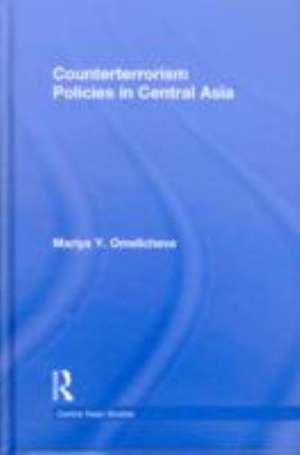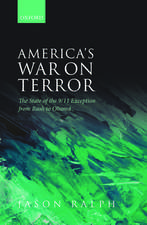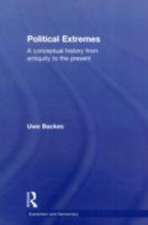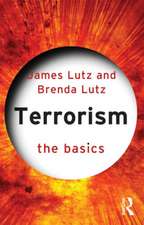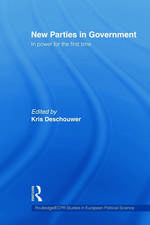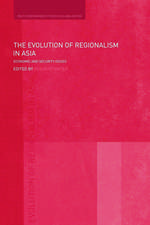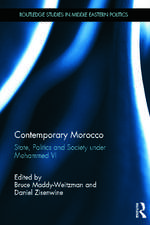Counterterrorism Policies in Central Asia: Central Asian Studies
Autor Mariya Y. Omelichevaen Limba Engleză Hardback – 29 iul 2010
This book examines the dangerous tendency of counterterrorism policies of the Central Asian states to grow more alike amid propensities for divergence and attributes this trend to the impact of the social context in which these states operate. It underscores the importance of international setting that shapes governments’ perceptions of terrorism and their counterterrorism policies. Applying a comprehensive theoretical framework, which integrates different mechanisms of international influences on state behaviour, the author explains the Central Asian states’ perceptions of terrorist threat and their counterterrorism responses. The book analyses the counterterrorism policies of Kazakhstan and Kyrgyzstan, the two Central Asian states that have been least affected by terrorist violence and Islamism but chose to combat those threats vigorously. Using materials derived from a wide range of sources, including legal documents, officials’ memoirs and fieldwork, this research will contribute to studies in Asian politics and national security, and international relations.
| Toate formatele și edițiile | Preț | Express |
|---|---|---|
| Paperback (1) | 481.58 lei 6-8 săpt. | |
| Taylor & Francis – 28 mar 2014 | 481.58 lei 6-8 săpt. | |
| Hardback (1) | 1057.05 lei 6-8 săpt. | |
| Taylor & Francis – 29 iul 2010 | 1057.05 lei 6-8 săpt. |
Din seria Central Asian Studies
-
 Preț: 379.30 lei
Preț: 379.30 lei -
 Preț: 339.60 lei
Preț: 339.60 lei -
 Preț: 324.35 lei
Preț: 324.35 lei -
 Preț: 348.59 lei
Preț: 348.59 lei -
 Preț: 386.54 lei
Preț: 386.54 lei - 12%
 Preț: 299.52 lei
Preț: 299.52 lei - 18%
 Preț: 1164.44 lei
Preț: 1164.44 lei -
 Preț: 407.52 lei
Preț: 407.52 lei - 26%
 Preț: 764.20 lei
Preț: 764.20 lei - 18%
 Preț: 1057.75 lei
Preț: 1057.75 lei - 28%
 Preț: 821.06 lei
Preț: 821.06 lei - 18%
 Preț: 1111.40 lei
Preț: 1111.40 lei - 13%
 Preț: 297.57 lei
Preț: 297.57 lei - 18%
 Preț: 1058.79 lei
Preț: 1058.79 lei - 12%
 Preț: 312.77 lei
Preț: 312.77 lei - 12%
 Preț: 299.52 lei
Preț: 299.52 lei - 19%
 Preț: 702.06 lei
Preț: 702.06 lei - 18%
 Preț: 1056.35 lei
Preț: 1056.35 lei - 18%
 Preț: 727.19 lei
Preț: 727.19 lei - 16%
 Preț: 260.93 lei
Preț: 260.93 lei - 18%
 Preț: 1218.34 lei
Preț: 1218.34 lei -
 Preț: 407.78 lei
Preț: 407.78 lei -
 Preț: 482.74 lei
Preț: 482.74 lei -
 Preț: 419.70 lei
Preț: 419.70 lei -
 Preț: 416.22 lei
Preț: 416.22 lei - 18%
 Preț: 1053.16 lei
Preț: 1053.16 lei - 15%
 Preț: 309.69 lei
Preț: 309.69 lei - 18%
 Preț: 1014.65 lei
Preț: 1014.65 lei -
 Preț: 436.14 lei
Preț: 436.14 lei - 18%
 Preț: 1060.87 lei
Preț: 1060.87 lei - 26%
 Preț: 763.23 lei
Preț: 763.23 lei -
 Preț: 488.71 lei
Preț: 488.71 lei - 18%
 Preț: 1108.42 lei
Preț: 1108.42 lei - 18%
 Preț: 1057.05 lei
Preț: 1057.05 lei - 31%
 Preț: 767.47 lei
Preț: 767.47 lei
Preț: 1057.05 lei
Preț vechi: 1289.09 lei
-18% Nou
Puncte Express: 1586
Preț estimativ în valută:
202.26€ • 211.18$ • 167.40£
202.26€ • 211.18$ • 167.40£
Carte tipărită la comandă
Livrare economică 04-18 aprilie
Preluare comenzi: 021 569.72.76
Specificații
ISBN-13: 9780415779814
ISBN-10: 0415779812
Pagini: 192
Ilustrații: 4 black & white tables
Dimensiuni: 156 x 234 x 13 mm
Greutate: 0.52 kg
Ediția:New.
Editura: Taylor & Francis
Colecția Routledge
Seria Central Asian Studies
Locul publicării:Oxford, United Kingdom
ISBN-10: 0415779812
Pagini: 192
Ilustrații: 4 black & white tables
Dimensiuni: 156 x 234 x 13 mm
Greutate: 0.52 kg
Ediția:New.
Editura: Taylor & Francis
Colecția Routledge
Seria Central Asian Studies
Locul publicării:Oxford, United Kingdom
Public țintă
PostgraduateCuprins
Introduction 1. A Reference Group Perspective on State Behaviour 2. Kyrgyzstan's Counterterrorism Policy 3. Kazakhstan's Counterterrorism Policy 4. Conclusion
Notă biografică
Mariya Y. Omelicheva is an Assistant Professor of Political Science at the University of Kansas, USA, where she teaches and conducts research on Eurasian security, counterterrorism and human rights, and Russian foreign policy. She has published in leading journals and contributed her research to edited volumes.
Recenzii
"Counterterrorism Policies in Central Asia is an exceptional book. Omelicheva's knowledge of the Islamic radical groups in Central Asia establishes her as one of the foremost academic experts in her field. However, the strength of this book is her ability to question the policies of Central Asian states in reaction to Islamic radical groups... Overall, Omelicheva should be proud of the tremendous amount of research that shines through in this book. The average as well as the advanced reader will walk away with a better understanding of counterterrorism, but perhaps more importantly, with a larger understanding of the influence of outside actors in the creation of common counterterrorism policies." - R. L. Bowman, Luther College
Descriere
This book examines the dangerous tendency of counterterrorism policies of the Central Asian states to grow more alike amid propensities for divergence and attributes this trend to the impact of the social context in which these states operate. It underscores the importance of international setting that shapes governments’ perceptions of terrorism and their counterterrorism policies.
